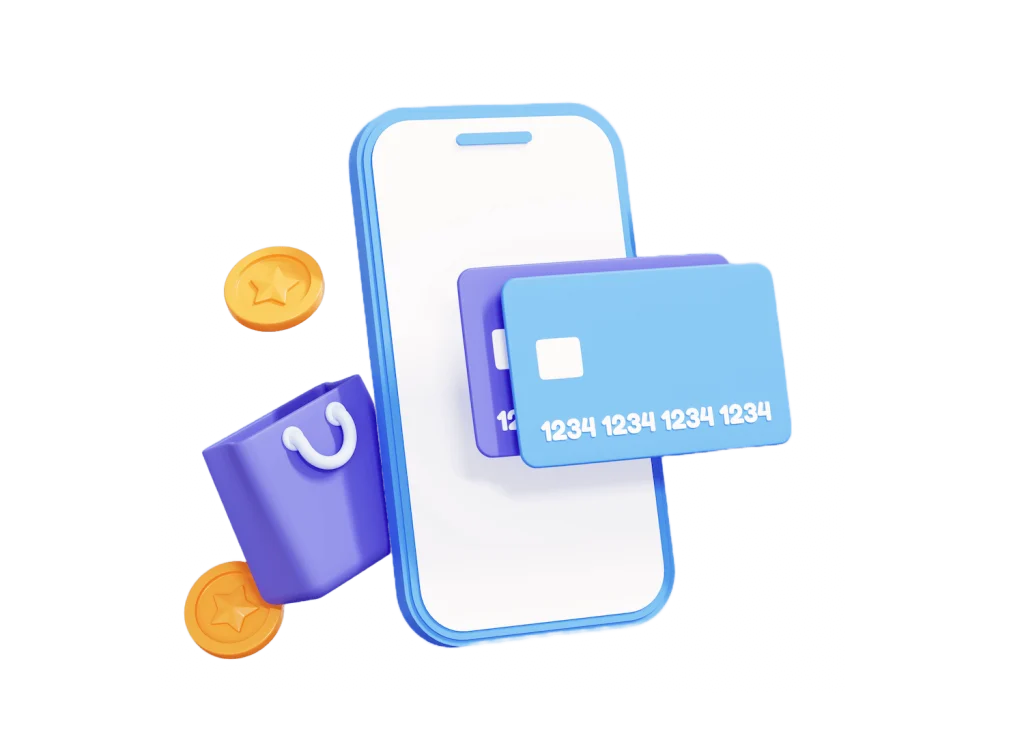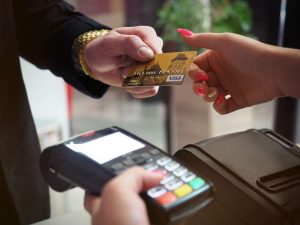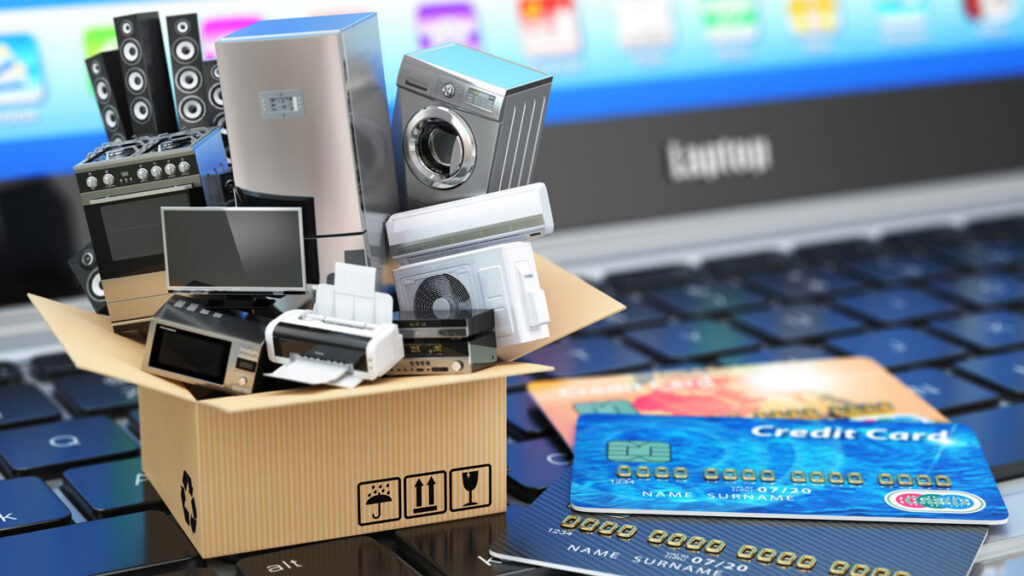
Credit cards are a safe and secure way to make payments. As well as inserting the card into the machine and typing in a PIN, you can also swipe or tap the card for a faster alternative. You can spend money up to a set credit limit, and you won’t have to repay the amount until a scheduled date each month.
Some people tend to spend more with a credit card than they do with cash or debit cards. Between 2018 and 2021, the average amount spent per credit card transaction in the UK was between £51 and £55.
In comparison, the average amount spent per cash transaction in 2021 was just £12.91, whilst the average amount in the following year was £13.87. Spending with debit cards lands somewhere in between these two payment methods. In 2021, the average debit card purchase amount was £34.
It isn’t easy to compare payment methods in the EU as each country has its own payment trends. However, the average value of a card transaction in the EU is estimated to be around €40, and whilst the EU statistic for cash isn’t available, in the Netherlands, the average amount spent per cash transaction was €17.34 during the same year, which certainly suggests credit card transactions are, on average, higher in the EU as well.
In this article, we’ll look at why some people spend more with credit cards than other payment methods and ways to help you control your credit card usage.
The psychology of credit cards
 According to a 2021 MIT study, people tend to spend more money with credit cards than cash because the cards activate the brain’s ‘rewards system’. People associate the act of tapping, swiping or inserting their cards with the pleasure of a purchase. They aren’t faced with the negative side-effect of funds being deducted from their accounts. In comparison, they would see immediate loss if they had to take money out of their wallet or see the money deducted straight from their bank account if they used a debit card.
According to a 2021 MIT study, people tend to spend more money with credit cards than cash because the cards activate the brain’s ‘rewards system’. People associate the act of tapping, swiping or inserting their cards with the pleasure of a purchase. They aren’t faced with the negative side-effect of funds being deducted from their accounts. In comparison, they would see immediate loss if they had to take money out of their wallet or see the money deducted straight from their bank account if they used a debit card.
One study suggests that one-fifth of people in the UK prefer using a credit card when making purchases worth over £100. This may be due to the added security that credit card companies give. Many credit card companies are legally obliged to investigate any issues that may occur if consumers aren’t provided with products or services that are up to standard. This means individuals may be more willing to spend larger sums of money because there is a better chance they can reclaim the money if something were to happen and they needed a refund.
‘Payment coupling‘ refers to the time between making a purchase and the money actually getting withdrawn from the bank account. As there is a larger time gap between these two events for credit card users, the process is less painful than for individuals who pay via other methods and see the money taken immediately. Consumers are, therefore, more likely to spend money via credit cards because they aren’t met with immediate repercussions from their purchases. The money doesn’t seem as ‘real’ which makes it easier to spend more and purchase items based on impulse.
When people make payments with cash, they can physically see the money leave their possession. This creates a ‘pain of paying’ mindset, which decrease/s a consumer’s willingness to make purchases in the future. However, on the flip side, this creates a more emotional bond between the consumer and the purchased item. They feel more responsible for the product as they are more aware of the money it takes to buy it.
Due to the increased expenditure on credit cards, there’s a higher chance that consumers will have a large credit card bill to pay off each month. They may forget how much they’ve spent altogether if they only think of each transaction as an individual payment. It’s important to use your credit card responsibly and pay your credit card debt off. Otherwise, you could end up facing a large amount of debt. This can affect your credit score, which can impact a variety of things, such as your ability to apply for a mortgage and take out loans.
Why do we spend more with credit cards?
Spending money with a credit card means that individuals don’t have to have access to large funds straight away and can repay the money at a later date. With cash, you can only spend as much as you have with you. Debit cards only allow you to spend as much as is in your account or your arranged overdraft. However, with credit cards, there are no immediate penalties for spending more than you intended to or what you have in your bank account.
In November 2022, the estimated credit card debt per household in the UK was estimated to be £2,290. People may find themselves with a larger credit card balance for a number of reasons, but a common reason is that consumers are more concerned with buying a product in the present than the future debt they will have to carry.
You don’t have to be fully aware of how much something costs with a credit card purchase because you won’t see the deduction immediately. This makes it easy to accumulate debt because you may not be fully aware of how much you are spending. You can quickly tap your card rather than count out notes and coins from your wallet.
Cash has largely fallen out of favour in recent years. Only around 10% of consumers make all of their purchases using cash rather than a credit or debit card. The majority of individuals who fall into this category are bankless and don’t have access to credit and debit cards. Cash is often deemed more awkward to pay with than cards because it involves counting out the right amount to give and checking the change is correct.
Some people prefer not to carry large quantities of cash out of safety concerns. It’s easier to cancel a credit or debit card if it’s stolen before any money is taken than reclaim stolen cash. For this reason, it’s more likely that consumers will only have enough cash to make small purchases and will use credit or debit cards for larger purchases.
How to avoid using a credit card
 Some people are tempted to spend more with a credit card because the money isn’t automatically deducted from their accounts or wallets. A good way to promote responsible credit card use is to remove your card as your default means of payment is to remove your card details from online payment method options. If you have to insert your details for each app or online service manually, the process will be slower and you may be able to talk yourself out of the purchase if it isn’t essential.
Some people are tempted to spend more with a credit card because the money isn’t automatically deducted from their accounts or wallets. A good way to promote responsible credit card use is to remove your card as your default means of payment is to remove your card details from online payment method options. If you have to insert your details for each app or online service manually, the process will be slower and you may be able to talk yourself out of the purchase if it isn’t essential.
You could hide your cards so that they aren’t readily available to take when you go out and about or when you want to shop online. This will force you into paying cash for purchases or using your debit card. It can be easier to budget if you only allow yourself to withdraw a certain amount of cash each month to use as spending money. To make it easier to stop using your card immediately, you could cut it up and cancel your account. You will need to make sure that you don’t have any ongoing subscriptions registered to your account or credit debt to pay off before you try to cancel your account.
Setting up standing orders for bills and using cash on all other purchases can also help you to avoid the need for a credit card. You won’t be faced with a credit card bill at the end of the month, which means you take immediate responsibility for your purchases.
An alternative method to credit, debit and cash is prepaid cards. This method can be used by people from various backgrounds, even those who aren’t eligible for credit cards, because your credit history isn’t taken into consideration. You put funds onto the card and then use it as you would a debit card. However, unlike a debit card, there is no overdraft so you can’t spend any more money than the amount on the card. You can’t get into debt with a prepaid card (as you can with a credit card) either, as you aren’t borrowing money.
Order your Prepaid Card today
Summary
People typically spend more with a credit card than they do with other payment alternatives because of the dissociation between using the credit card and the money actually being spent. Many consumers forget that they’re using ‘real’ money because they don’t have to see the money disappear from their wallets or bank accounts straight away.
If you struggle with impulse spending or need to take control of your credit card use then check out our guide on how to stop overspending. Simple steps like working out your spending triggers or creating a budget can make a huge difference to both your relationship with money and your financial situation.


